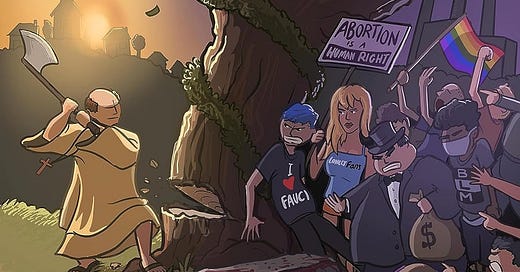It's clear from the opening sentence, or even the cover art, where we're going with this. "Trashworld: You live in a dystopia." Things can indeed get worse, but they are already very bad, and the extent to which they have not hit terminal velocity is mostly due to the hangover of institutions and demography that are not dying so much as being killed.
The response to this is given by the titular Saint Boniface, who chopped down pagan idols in a physical and metaphysical demonstration of the power of his God - to on the one hand actually succeed in smashing them, but on another to demonstrate the courage with which he was willing to attempt it.
It is also a conscious contrast to Rod Dreher's "The Benedict Option", which did not go unnoticed by Dreher - a man so in love with the smell of his own farts he assumed the Pope was familiar with his work and assumes his audience waits with bated breath for the next story of his aesthetic experience of his classmates' genitalia while he ponders how his sister's death really makes him think, mostly about himself.
It's a shame that Dreher called dibs on the various saint-options, because unlike Dreher's self-justification for "maybe I move to Hungary and blog until the world recognizes my genius", Isker is willing to self-consciously grapple with the limited utility of reason and debate in a world primarily driven by power - "while obviously useful, arguments do not matter in this culture clash".
What then is the point of a textual polemic? On the level of power politics, it's obviously not meant to convince Susan the United Methodist who thinks Christianity is about being nice but worries about girls sports with all this stuff going on. It's not a Gramscian plan for forming cabals that can take over institutions. It's not really a political strategy document that points out the hundred dollar bills lying on the sidewalk for the politicians willing to talk about the interests of the primary political constituency of the country.
What this book seems to be is a rather meta exhortation that externally focused Christian apologetics focus first on the fact that things are not okay, and secondarily on the positive vision of Christianity that addresses those issues. Some reviewers have made the mistake of assuming Isker is trying to convince the reader when he details the deep societal ills generated by and recursively generating "Trashworld". This is not really the case - it is a brief book, and the individual chapters briefer still. What those sections serve to do is point out, which is a different tack altogether. No one who buys this book is going to be convinced by it into the idea that there are two sexes or that educational standards have plummeted or that Unthreatening Boyfriend Jesus is fundamentally unsatisfying, because that is mostly what they already believe. But as a manual for future polemicists and Christian apologists it highlights these issues as ones that discomfort even the normie id.
The "deconstruction", or just condemnation and destruction, of these edifices of Trashworld is then followed by the construction of a positive Christian vision that recognizes, eg, that every part of the Bible is important, including the Old Testament bits about slaying and laying, or that men have a unique and separate role within the church and society at large. Importantly, this is an inversion of the typical advice for building mass movements, which almost exclusively start with the motte ("decolonization means being nice to black people") and end with the bailey ("...and murdering 'settler' children"), driven heavily by vanguardism and feedback effects within participating institutions.
Obviously Christian religious movements, or right wing political coalitions, do not have the same toolkits available to them as left wing political movements. Exploring that would be its own book-length, or career-length, endeavor. To some extent in the Christian context the argument relies on the fact that actual Christian theology is so divorced from the average person's day to day worldview that you simply cannot meet them on that level, and instead need to point out they are sick because they eat poisoned fruit, and the poisoned fruit comes from a poisoned tree. The same may in fact be true for right wing politics. It may be that construction of a "positive right wing vision for society" is secondary to, eg, vocally pointing out that the "land acknowledgment" everyone dozes through is an incitement to murder, and the structural change necessary to exclude the left from political power only follows smashing those left wing idols.





